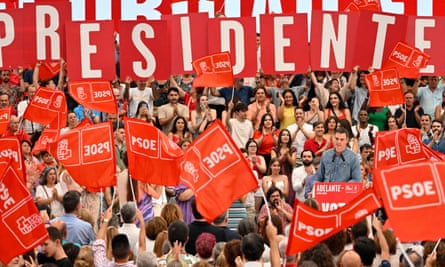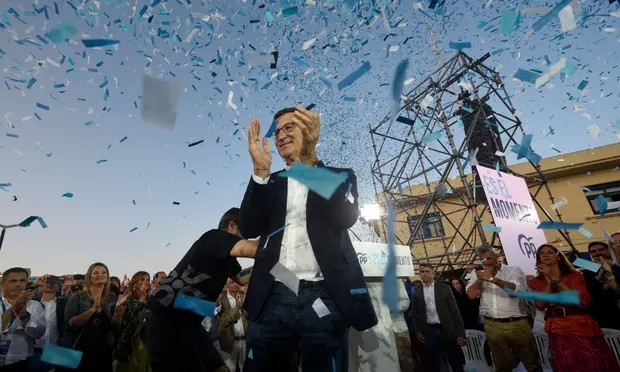Polls suggest conservative PP will need the support of far-right Vox party to form a government
Spaniards are heading to the polls to vote in a bitterly contested general election that could see the far right play a key role in government for the first time since the country returned to democracy after General Franco’s death five decades ago.
The vote, called two months ago by Spain’s prime minister, Pedro Sánchez, after his Spanish Socialist Workers party (PSOE) suffered a drubbing in May’s regional and municipal elections, offers people a stark choice between the left and right blocs.
While the opposition conservative People’s party (PP) is expected to finish first, polls suggest it is likely to fall short of an absolute majority and to have to rely on the support of the far-right Vox party to form a government.
Sánchez has depicted Sunday’s vote as a crucial showdown between the forces of progress and the forces of reactionary conservatism. The prime minister argues that only the PSOE and the new, leftwing Sumar alliance, led by Spain’s deputy prime minister and labour minister, Yolanda Díaz, can defend and deliver the progressive agenda he has pursued over the past four years.
But the PP and Vox – which have forged more regional governing coalitions since May’s elections – accuse Sánchez and his minority government partners in the Unidas Podemos alliance of being weak, opportunistic and over-reliant on the Catalan and Basque separatist parties on which it depends for support in parliament.
They also say Sánchez and his partners have failed Spaniards through their badly botched reform of sexual offences legislation which has led to more than 100 convicted sex offenders being granted early release.
Although the PP has consistently led the polls and waged an aggressive campaign, it suffered a poor final week as the focus shifted to its leader, Alberto Núñez Feijóo. He had already been left looking awkward after his claims about the PP’s track record on pensions turned out to be untrue, but was then criticised for the sexist tone of an apparent reference to Díaz’s makeup.
By Friday, Feijóo found himself having to respond to renewed questions about his friendship in the 1990s with a man who was later convicted of drug trafficking.
The PP leader, who was a senior politician in Galicia before serving as regional president between 2009 and last year, has faced fresh scrutiny over his relationship with Marcial Dorado, who was arrested in 2003 and subsequently jailed for offences including drug trafficking, bribery and money laundering.
Feijóo has always insisted he had no reason to suspect Dorado was involved in anything illegal and has said he broke off contact with him as soon as he was charged with criminal offences.
“It’s easier to find out about these things now because you’ve got the internet and Google,” Feijóo said on Wednesday. “When I knew him, this gentleman wasn’t facing any proceedings over drug trafficking.”
Two days later, Feijóo accused his opponents of trying to smear him, adding that when he knew Dorado, he “had been a smuggler [but] never a drug trafficker”.
Sánchez, who was unexpectedly beaten by Feijóo in the only head-to-head debate between the leaders of Spain’s two biggest parties, seized on the controversy and confusion as proof of the left’s growing comeback.
“I see a right and a far-right that are absolutely bankrupt,” he said at his party’s final campaign rally near Madrid on Friday night. “The socialist advance is unstoppable. All I ask is that we all bet on red on Sunday to win the election and guarantee four more years of progress.

Díaz, meanwhile, exhorted people to get out and vote so that Spanish society “doesn’t go back 50 years”.
Feijóo urged Spaniards to vote “to bring our country together again” and said that, unlike Sánchez, he was beholden to no one.
“I’ve got no debts or deals with anyone,” he told supporters in the Galician city of A Coruña on Friday. “I don’t need to answer to anyone except the Spanish people.”
Vox, which has made culture wars a central part of its campaign, called on Spaniards to come out and speak up. Addressing a rally in Madrid on Friday, the far-right party’s leader, Santiago Abascal, laid into the government over its ideology and bungled sexual offences legislation.
“There are millions of Spaniards who want to say yes to freedom of expression and no to cancel culture,” he said. “[And millions] who want to say yes to safe streets and no to the government of rapists.”
An Ipsos poll for La Vanguardia this month found that the economy was the single biggest issue for voters, with 31% of those surveyed putting it at the top of their list. Next was unemployment (10%) and healthcare (9%). Immigration, one of Vox’s favourite talking points, was the most important issue for just 2% of those polled.
Source: The Guardian




Recent Comments